Development Dynamics
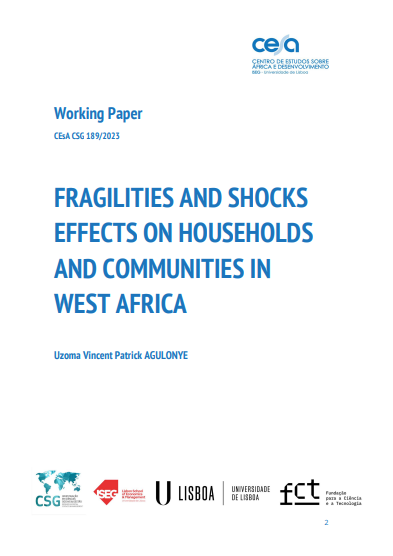
Working Paper 189/2023: Fragilities and shocks effects on households and communities in West Africa
Abstract:
Shocks are drivers of fragility yet most works on fragility in Africa use the tag “fragile state(s)” with less focus on the drivers of fragility in its institutions, states, and economies. Shocks are cardinal to the entrenchment or stability of any system. The Covid-19 pandemic revealed how fragile the world is including the “developed” or “advanced” systems. Today, households, businesses, and communities in most parts of Sub-Saharan Africa suffer the effects of a triple whammy (climate change, the pandemic and Russia/Ukraine War) including effects of history and an unfavourable global system all of which leaves them in hunger, poverty and vulnerable conditions. Fragilities and Shocks Effects on Households and Communities in West Africa used secondary sources to revisit the effects of these shocks on households, and communities in West Africa through the lens of common resources. The recent shocks effects prevalent in all these countries is higher than reported and would affect West Africa´s growing population in the foreseeable future with the absence of safety nets or effective interventions. The absence of shocks preparation in the subregion is not sustainable and adds up to the sustenance of the revolving circle of fragility in the subregion.
Quotation:
Agulonye, U.V.P. 2023. “Fragilities and Shocks Effects on Households and Communities in West Africa“. Instituto Superior de Economia e Gestão – CEsA/CSG – Documentos de Trabalho nº 189/2023
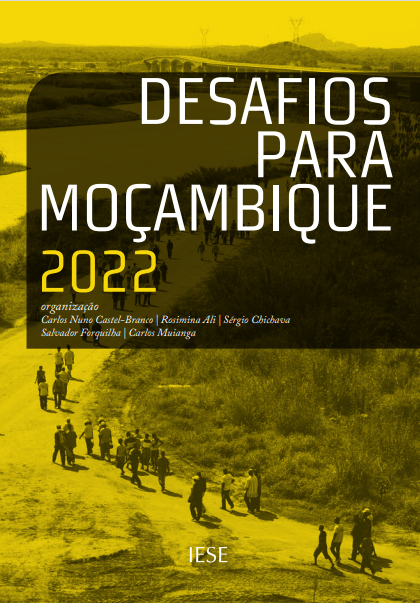
Desafios para Moçambique, 2022
Abstract:
This issue of Desafios para Moçambique (2022) comes as the country faces enormous challenges – the war in Cabo Delgado, with some signs of expansion into other provinces; the Rovuma basin gas extraction and liquefaction projects, which realise some 24 Challenges for Mozambique 2022 Introduction of the greatest challenges in Mozambique’s economic history; the lingering effects of the global crisis, the bursting and implosion of the economic bubble, of which the sovereign debt crisis was a manifestation, and the social and economic after-effects of the covid-19 pandemic. These challenges and crises stimulated research and resulted in lessons, some of which are developed in this issue. Recently ended in Maputo, the trial of some of the state agents and private agents involved in the illicit international financial transactions that resulted in the odious debts. What was already clear before – that these illicit transactions are a reflection of more general dynamics of expropriation, privatisation and financialisation of the state for private accumulation of capital, even if this is done at heavy social costs – has, if possible, become clearer. The hypothesis that the legal process, which we had the opportunity to follow for about a year and a half, only touched on the recipients of commissions for corruption and influence peddling, the executors of the great default against the public purse, was confirmed.
Quotation:
Castel-Branco, C.N., Ali, R., Chichava, S., Forquilha, S., Muianga, C. (2022) Desafios para Moçambique, 2022. IESE. Maputo, Moçambique. ISBN: 978-989-8464-58-3
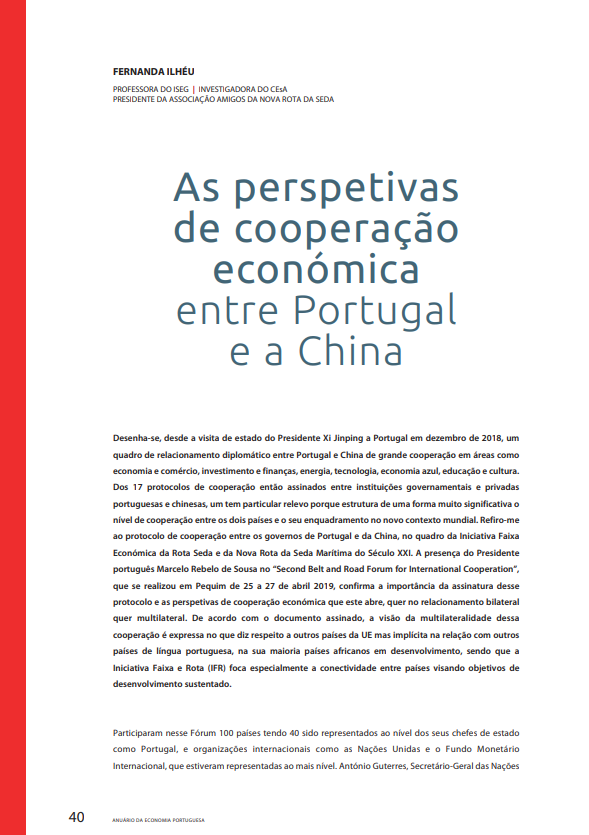
As Perspetivas de Cooperação Económica entre Portugal e a China
Abstract:
As Perspetivas de Cooperação Económica entre Portugal e a China exposes how Since the state visit of President Xi Jinping to Portugal in December 2018, a framework for diplomatic relations between Portugal and China has been established, with a high level of cooperation in areas such as economy and trade, investment and finance, energy, technology, blue economy, education and culture. Of the 17 cooperation protocols signed then between Portuguese and Chinese governmental and private institutions, one is of particular relevance because it structures in a very significant way the level of cooperation between the two countries and its framework in the new global context. I am referring to the cooperation protocol between the governments of Portugal and China, within the framework of the Silk Road Economic Belt Initiative and the New 21st Century Maritime Silk Road. The presence of Portuguese President Marcelo Rebelo de Sousa at the “Second Belt and Road Forum for International Cooperation”, which was held in Beijing from 25 to 27 April 2019, confirms the importance of the signing of this protocol and the prospects for economic cooperation that it opens, both in bilateral and multilateral relations. According to the signed document, the vision of the multilaterality of this cooperation is expressed with regard to other EU countries but implicit in the relationship with other Portuguese-speaking countries, mostly African developing countries, with the Belt and Road Initiative (IFR) focusing especially on connectivity between countries aimed at sustainable development objectives.
Quotation:
Fernanda Ilhéu (2019), As Perspetivas de Cooperação Económica entre Portugal e a China. O Economista-Anuário da Economia Portuguesa, 32ª Edição, Ordem dos Economistas, ISBN 1646-9909, pp:40-45, Lisboa.
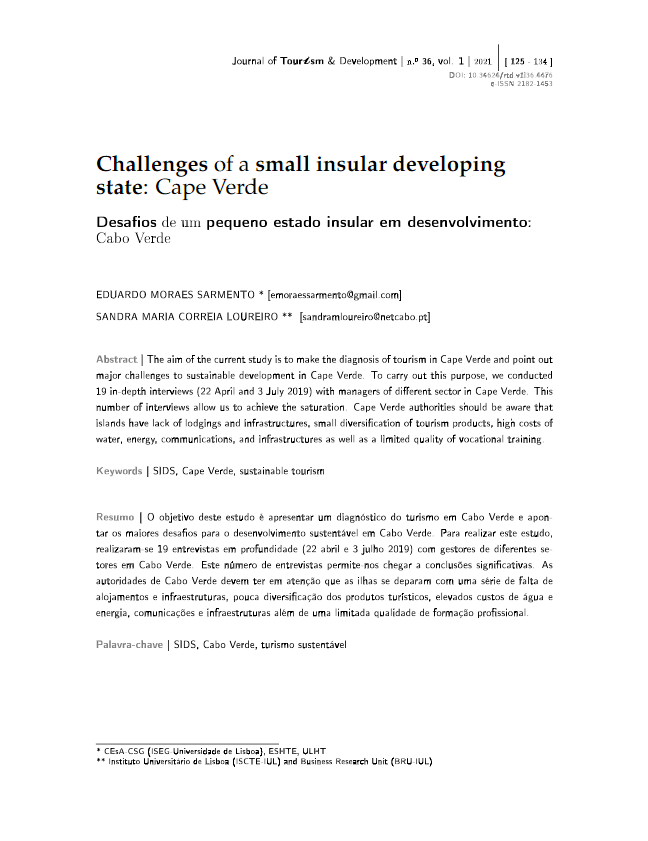
Challenges of a small insular developing state: Cape Verde
Abstract:
The objective of Desafios de um pequeno estado insular em desenvolvimento: Cabo Verde is to present a diagnosis of tourism in Cape Verde and point out the major challenges for sustainable development in Cape Verde. To carry out this study, 19 in-depth interviews (22 April and 3 July 2019) were conducted with managers from different sectors in Cape Verde. This number of interviews allows us to reach significant conclusions. The Cape Verdean authorities must take into account that the islands are faced with a series of shortages of accommodation and infrastructure, little diversification of tourism products, high costs of water and energy, communications and infrastructure in addition to a limited quality of professional training. In order to achieve a hub economy, Cape Verde needs to implement a strong strategy to capture foreign domestic investment (FDI) supported by a strong diplomatic strategy. Like many other SIDS, Cape Verde suffers from an enormous shortage of capital, technology, qualified human resources, high-level organizational capacity, and markets. FDI brings in resources and, in doing so, has direct, indirect, and induced effects on all sectors of economic and social life, as well as the improvement of macroeconomic variables, like GDP, the balance of payments, employment, income and government revenue.
Quotation:
Sarmento, E., & Loureiro, S. M. (2021). Desafios de um pequeno estado insular em desenvolvimento: Cabo Verde. Revista Turismo & Desenvolvimento, 36(1), 125-134. https://doi.org/10.34624/rtd.v1i36.4476
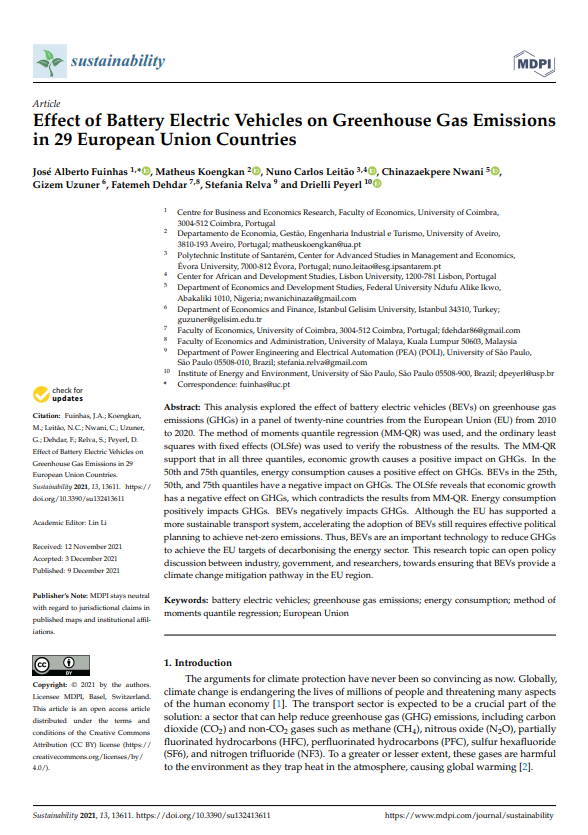
Effect of Battery Electric Vehicles on Greenhouse Gas Emissions in 29 European Union Countries
Abstract:
Effect of Battery Electric Vehicles on Greenhouse Gas Emissions in 29 European Union Countries explored the effect of battery electric vehicles (BEVs) on greenhouse gas emissions (GHGs) in a panel of twenty-nine countries from the European Union (EU) from 2010 to 2020. The method of moments quantile regression (MM-QR) was used, and the ordinary least squares with fixed effects (OLSfe) was used to verify the robustness of the results. The MM-QR support that in all three quantiles, economic growth causes a positive impact on GHGs. In the 50th and 75th quantiles, energy consumption causes a positive effect on GHGs. BEVs in the 25th, 50th, and 75th quantiles have a negative impact on GHGs. The OLSfe reveals that economic growth has a negative effect on GHGs, which contradicts the results from MM-QR. Energy consumption positively impacts GHGs. BEVs negatively impacts GHGs. Although the EU has supported a more sustainable transport system, accelerating the adoption of BEVs still requires effective political planning to achieve net-zero emissions. Thus, BEVs are an important technology to reduce GHGs to achieve the EU targets of decarbonising the energy sector. This research topic can open policy discussion between industry, government, and researchers, towards ensuring that BEVs provide a climate change mitigation pathway in the EU region.
Citação:
Fuinhas, J.A., Koengkan, M., Leitão, N.C., Nwani, C., Uzuner, G., Dehdar, F., Relva, S., Peyerl, D. (2021). Effect of Battery Electric Vehicles on Greenhouse Gas Emissions in 29 European Union Countries. Sustainability, 13 (24), 13611. https://doi.org/10.3390/su132413611
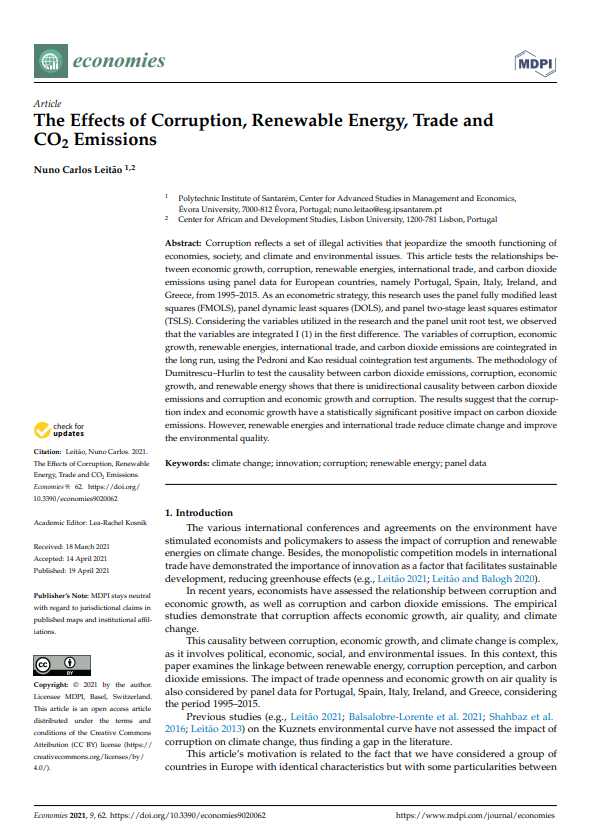
The Effects of Corruption, Renewable Energy, Trade and CO2 Emissions
Abstract:
Corruption reflects a set of illegal activities that jeopardize the smooth functioning of economies, society, and climate and environmental issues. The Effects of Corruption, Renewable Energy, Trade and CO2 Emissions tests the relationships between economic growth, corruption, renewable energies, international trade, and carbon dioxide emissions using panel data for European countries, namely Portugal, Spain, Italy, Ireland, and Greece, from 1995–2015. As an econometric strategy, this research uses the panel fully modified least squares (FMOLS), panel dynamic least squares (DOLS), and panel two-stage least squares estimator (TSLS). Considering the variables utilized in the research and the panel unit root test, we observed that the variables are integrated I (1) in the first difference. The variables of corruption, economic growth, renewable energies, international trade, and carbon dioxide emissions are cointegrated in the long run, using the Pedroni and Kao residual cointegration test arguments. The methodology of Dumitrescu–Hurlin to test the causality between carbon dioxide emissions, corruption, economic growth, and renewable energy shows that there is unidirectional causality between carbon dioxide emissions and corruption and economic growth and corruption. The results suggest that the corruption index and economic growth have a statistically significant positive impact on carbon dioxide emissions. However, renewable energies and international trade reduce climate change and improve the environmental quality.
Quotation:
Leitão, N.C. (2021b). The Effects of Corruption, Renewable Energy, Trade and CO2 Emissions (MDPI) 2021, 9 (2), 62. https://doi.org/10.3390/economies9020062
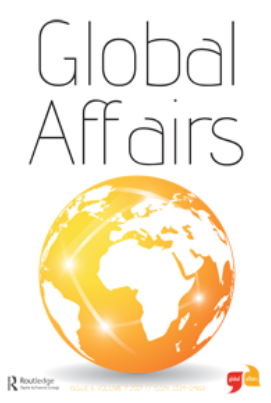
Navigating ontological (in)security in EU–Africa relations
Abstract:
When the first six members of the European Economic Community (EEC) took that initial step towards deeper integration that has culminated in what is now the European Union (EU), they also agreed “to associate with … the non-European countries and territories which have special relations with Belgium, France, Italy, the Netherlands and the United Kingdom”. Six decades on and several attempts to re-set EU-Africa relations, it is appropriate to take stock of the relationship especially in light of changes in both continents since 2000. This article draws on the idea of ontological security to understand the nature of changes and continuities in the EU’s engagement with Africa. It argues that EU-Africa relations that have relied on a coloniality of power have also been crucial to the EU’s ontological security. However, increasing African agency and new external actors like China in Africa are challenging this security. While challenges to the EU’s ontological security have been viewed as primarily internally constituted, external challenges within a specific context provides the opportunity to rethink what ontological security demands. Importantly, Navigating ontological (in)security in EU–Africa relations highlights why a partnership of equals is an urgent imperative for the future of EU-Africa relations, although it remains elusive.
Quotation:
Toni Haastrup, Niall Duggan & Luis Mah (2021) Navigating ontological (in)security in EU–Africa relations, Global Affairs, 7:4, 541-557, DOI: 10.1080/23340460.2021.1981144
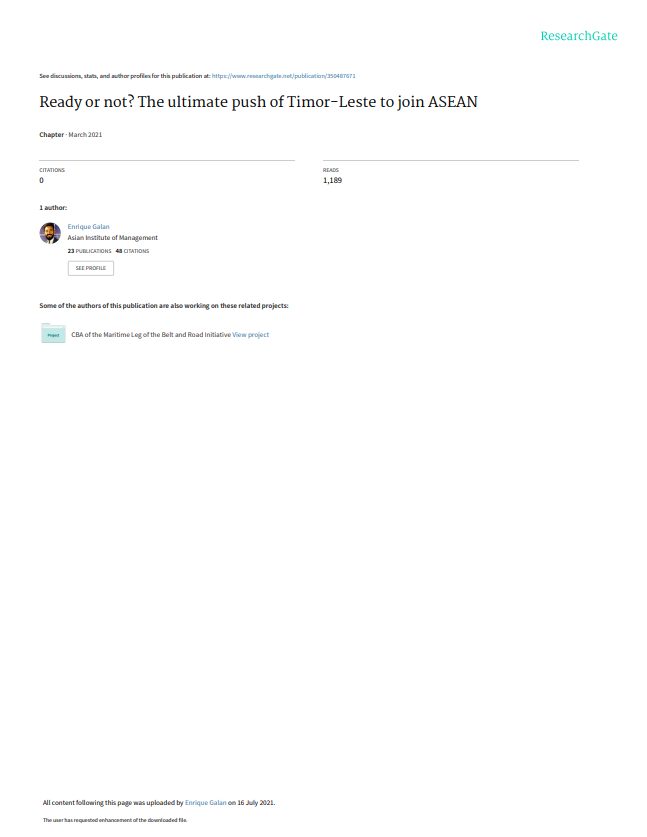
Ready or not? The ultimate push of Timor-Leste to join ASEAN
Abstract:
A persistent concern raised by member states of the Association of South East Asian Nations (ASEAN) is that Timor-Leste’s readiness for membership is not enough, as Dili, the smallest economy in Southeast Asia, may not be able to sign and implement key commitments, nor to participate in all ASEAN institutions and work programmes. Since its formal request for membership in 2011, Timor-Leste has recently stepped up its efforts for ASEAN membership, with the initial technical support of the Japan International Cooperation Agency and, particularly, the enhanced support of the Asian Development Bank. In 2019, there has been a step change in momentum towards accession, with clear ASEAN statements signalling progress in this regard. The first ever ASEAN fact-finding mission to Timor-Leste to assess the country’s potential for membership concluded successfully in September 2019. Two more fact-finding missions are planned for 2020. We assess in this paper Timor-Leste’s readiness for membership in the three pillars of the ASEAN community: economic, socio-cultural, and political security. In Ready or not? The ultimate push of Timor-Leste to join ASEAN, we assess how recent developments address the concerns historically raised by some ASEAN member states about Timor-Leste’s membership. We conclude that the Cambodian and, particularly, the Indonesian presidencies of the ASEAN in 2022 and 2023 could be an important landmark for Timor-Leste’s accession to the Association.
Quotation:
Martínez-Galán, E. (2021). ‘Ready or not? The ultimate push of Timor-Leste to join ASEAN’. Chapter 4B, pp. 405-435 in Leandro, F.J.B.S., dos Santos, P.P. and Li, Y. (eds) China and Portuguese-speaking Small Island States: From sporadic bilateral exchanges to a comprehensive multilateral platform. City University of Macau. Macao. China. ISBN 978-99981-956-3-9
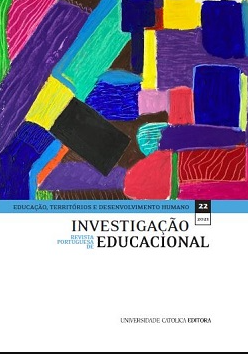
Sources and consequences of teachers’ stress during the Covid-19 pandemic
Abstract:
The covid-19 pandemic has had serious and unprecedented consequences on multiple facets of education. Teachers, students, schools and families have been affected, and the impacts of the pandemic will spill over into the future as well. The aim of Fontes e consequências do stress dos professores durante a pandemia da Covid-19 is to identify and explain the sources and consequences of teachers’ work-related stress and burnout during the pandemic, as well as their job and life satisfaction. Three sources of stress are considered: changes in organisation, content and amount of work; student behaviour and performance; and technostress. The empirical research is based on an original online survey applied to public school teachers (ISCED 2 and 3) in Portugal. Information is collected for four periods: before the pandemic; in the first school closure period in 2020 (16 March-16 September); in the second school closure period in 2021 (15 January-5 April); in the survey period (June-July 2021). The data collected include characteristics and changes about: teachers and their families; job satisfaction, stress and burnout; life satisfaction; working time and teaching duties; work-life balance; teaching goals, methods and outcomes; job stress; conditions for doing remote teaching; expectations for the 2021-22 school year. The results show that teachers’ work stress increased during the pandemic, with student behaviour and performance being a relevant explanatory factor. Difficulties in reconciling work and personal time are also predictors of teachers’ work stress. There are also signs of increasing burnout.
Quotation:
Pato, S., & Fontainha, E. (2021). Fontes e consequências do stress dos professores durante a pandemia da Covid-19. Revista Portuguesa De Investigação Educacional, (22), 1-17. https://doi.org/10.34632/investigacaoeducacional.2021.10467
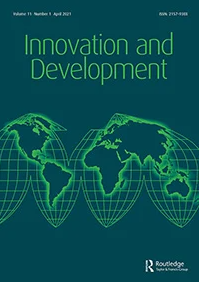
Innovation in development cooperation: emerging trajectories and implications for inclusive sustainable development in the 21st century
Abstract:
In the past twenty years, innovation has slowly, but steadily, become an important presence in development cooperation discourse and practice. The ambitious UN 2030 Sustainable Development Agenda has accelerated this trend, providing a strong framework for the main argument in favour of an innovation agenda for international development: without new ideas and innovative solutions, solving the current global development challenges will not be possible. Although this innovation-push is in line with a wider predominant view of innovation as an inherently positive force of progress, that alone does not explain when, how, and why innovation becomes a key topic in the field. This article seeks to fill this gap in the literature, providing an initial overview of innovation in development cooperation in the post-2000s. It argues, firstly, that innovation has always been part of international development policy and practice. Secondly, it links the recent strengthening of the innovation discourse to three trends in the systemic transformation of the field: the triumph of metrics-based agendas, the ICTs and digitalization revolutions, and the role of private sector actors. It concludes by critically assessing the implications of this narrative in changing the politics of innovation towards more inclusive sustainable development policies and practices.
Quotation:
Ana Luísa Silva (2021) Innovation in development cooperation: emerging trajectories and implications for inclusive sustainable development in the 21st century, Innovation and Development, 11:1, 151-171, DOI: 10.1080/2157930X.2020.1807100





